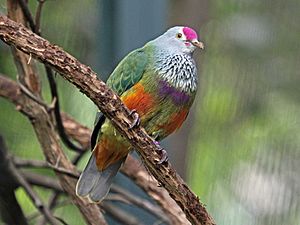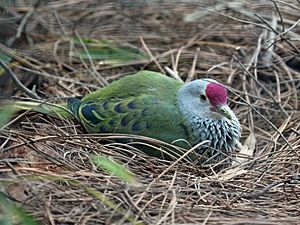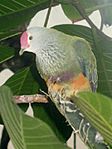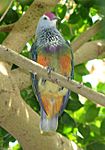Mariana fruit dove facts for kids
Quick facts for kids Mariana fruit dove |
|
|---|---|
 |
|
| At San Diego Zoo | |
| Conservation status | |
| Scientific classification |
|
| Kingdom: | Animalia |
| Phylum: | Chordata |
| Class: | Aves |
| Order: | Columbiformes |
| Family: | Columbidae |
| Genus: | Ptilinopus |
| Species: |
P. roseicapilla
|
| Binomial name | |
| Ptilinopus roseicapilla (Lesson, 1831)
|
|
| Script error: The function "autoWithCaption" does not exist. | |
Script error: No such module "Check for conflicting parameters".
The Mariana fruit dove (Ptilinopus roseicapilla) is a small, colorful bird. It is found only on Guam and the Northern Mariana Islands in the Pacific Ocean. This bird is also known by local names like mwee’mwe in the Carolinian language. On Guam, it's called totot, and in the Northern Marianas Islands, it's known as Paluman totut.
These doves are about 24 centimeters (9.5 inches) long. They have a bright red forehead and a greyish head, back, and chest. Their belly has a yellow patch, and their undertail feathers are also yellow.
Contents
Life Cycle and Diet
The female Mariana fruit dove lays only one white egg at a time. Both the mother and father dove work together. They care for the egg and their chick once it hatches. The main food for these doves is fruit.
Cultural Importance
This special bird is a very important symbol for the Mariana Islands. It is even the official bird of the Northern Mariana Islands. In 2005, the Mariana fruit dove was first chosen to be the mascot for the 2006 Micronesian Games held in Saipan. However, a different bird, the tropicbird, later became the official symbol for those games.
Threats and Conservation
The Mariana fruit dove faces serious threats that could lead to its extinction. One big problem is habitat loss. This means the places where they live are being destroyed.
A much larger threat is the Brown tree snake. These snakes were accidentally brought to Guam during World War II. The native birds on Guam were not used to predators like these snakes. Because of this, the snakes greatly reduced the number of birds on the island. The Mariana fruit dove has been extinct on Guam since 1984. It is now highly endangered on other islands where it lives. If these snakes spread to the Northern Marianas Islands, it could be very bad for the doves there.
To help save these birds, several zoos have started special programs. These programs help the doves breed in captivity. The Saint Louis Zoo in St. Louis, Missouri, has one of the most successful breeding programs. This program began in 1993.
Endangered Status
Because of ongoing habitat loss, its small living area, and the danger from invasive species, the Mariana fruit dove is listed as Endangered. This status is given by the IUCN Red List of Threatened Species.
Gallery
See also
 In Spanish: Tilopo de las Marianas para niños
In Spanish: Tilopo de las Marianas para niños
 | Selma Burke |
 | Pauline Powell Burns |
 | Frederick J. Brown |
 | Robert Blackburn |





